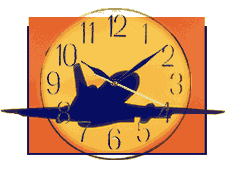 |
 |
 |
|
|||
|
Avoiding Flight Delays

Last week, United Airline's announcement that it would buy US Airways garnered the travel headlines. But United has a more immediate problem on its hands. Unlike last year's slowdown by American Airlines pilots who called in sick in droves as a labor action, United's problems with its pilots have crept in on cat's feet. Earlier this month, many United pilots began to refuse overtime, apparently as a way of putting pressure on management in contract negotiations. The result has been hundreds of flight cancellations, 900 alone one week. Now, thunderstorms along the East Coast and in the Midwest are partly to blame for the unusually high number of problems. But weather delays mean pilots work their required hours all that much faster. And if pilots decline overtime, there's no way any airline can keep their planes in the air. A spokesman for the pilots' union says it's a pilot's right to decline overtime, and there's no coordinated effort to encourage pilots to do so. He's right on the first part, of course, but it sure seems strange that suddenly so many United pilots have decided to say "No thanks" to overtime. Let's talk about flight delays. They're getting increasingly common, and not just because of the United situation. The commercial aviation infrastructure in the U.S. is overburdened. More and more passengers, attracted by low fares and fueled by a strong economy, are flying. Air traffic controllers are still hobbled by old equipment. What can you do? Here are some basic rules for improving your odds of an on-time departure and arrival.
As for United's labor problem, try to avoid flying United late in the month, like right now, when pilots will have maxed out their flying time. Until United solves this problem, it's month's end when you can expect most delays to occur. Here's to your spending less time sitting around terminals this summer. |
 | American Public Media Home | Search | How to Listen ©2004 American Public Media | Terms of Use | Privacy Policy |